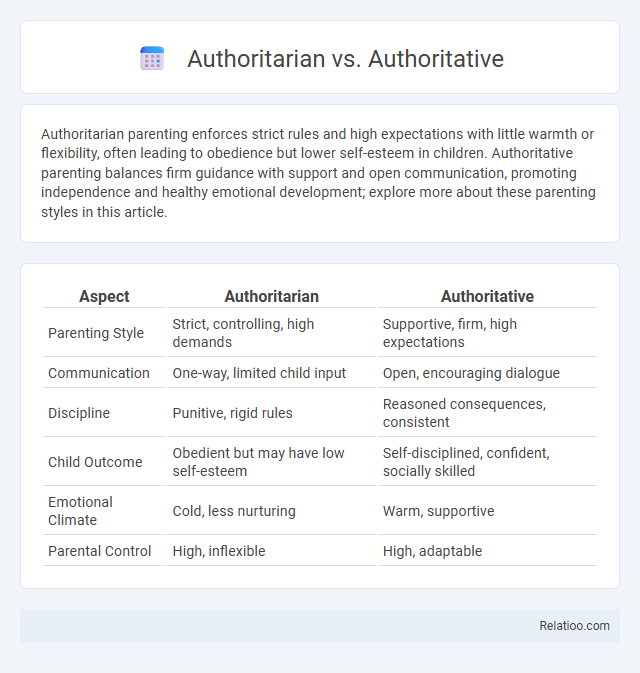Authoritarian parenting enforces strict rules and high expectations with little warmth or flexibility, often leading to obedience but lower self-esteem in children. Authoritative parenting balances firm guidance with support and open communication, promoting independence and healthy emotional development; explore more about these parenting styles in this article.
Table of Comparison
| Aspect | Authoritarian | Authoritative |
|---|---|---|
| Parenting Style | Strict, controlling, high demands | Supportive, firm, high expectations |
| Communication | One-way, limited child input | Open, encouraging dialogue |
| Discipline | Punitive, rigid rules | Reasoned consequences, consistent |
| Child Outcome | Obedient but may have low self-esteem | Self-disciplined, confident, socially skilled |
| Emotional Climate | Cold, less nurturing | Warm, supportive |
| Parental Control | High, inflexible | High, adaptable |
Introduction to Parenting Styles
Parenting styles significantly influence child development, with authoritarian, authoritative, and permissive being the primary categories. Authoritarian parents enforce strict rules and expect obedience without question, often leading to high levels of discipline but lower emotional warmth. In contrast, authoritative parents combine firm guidelines with supportive communication, fostering independence and self-regulation, while permissive parents offer warmth and freedom, setting minimal boundaries.
Defining Authoritarian Parenting
Authoritarian parenting is defined by strict rules, high demands, and little warmth or responsiveness, often resulting in children who are obedient but may lack self-esteem and social skills. This style contrasts with authoritative parenting, which balances firm expectations with support and open communication, fostering independence and confidence. Understanding these distinctions helps you adapt your approach to promote healthier development and stronger parent-child relationships.
Defining Authoritative Parenting
Authoritative parenting combines high expectations with warmth and support, promoting independence while maintaining clear boundaries. This style contrasts with authoritarian parenting, which emphasizes strict rules and obedience without emotional responsiveness, and permissive parenting, which offers warmth but lacks consistent discipline. Your understanding of authoritative parenting highlights balanced guidance that fosters self-discipline, social competence, and emotional resilience in children.
Key Differences Between Authoritarian and Authoritative
Authoritarian parenting enforces strict obedience with high demands and low responsiveness, often using punishment to control behavior, whereas authoritative parenting combines high expectations with warmth and support, promoting open communication and autonomy. The key difference lies in responsiveness; authoritative parents engage with their children's needs and encourage independence, while authoritarian parents prioritize control and obedience over emotional connection. Research shows authoritative parenting fosters better psychological outcomes and social competence compared to the often rigid and punitive style of authoritarian parenting.
Impact on Child Development
Authoritarian parenting, characterized by strict rules and high demands, often leads to children experiencing lower self-esteem and increased anxiety due to lack of emotional warmth. Authoritative parenting balances firm expectations with support and responsiveness, fostering greater social competence, self-regulation, and academic success in Your child. In contrast, permissive parenting, marked by leniency and inconsistent discipline, may result in children struggling with self-discipline and exhibiting behavioral problems due to insufficient boundaries.
Communication Styles Compared
Authoritarian communication style is characterized by strict, one-way directives where Your input is limited, emphasizing obedience and control without room for dialogue. Authoritative communication balances clear, firm expectations with open, respectful conversations that encourage understanding and cooperation. In contrast, authoritarian communication often involves aggressive, punitive language that suppresses feedback and fosters fear rather than mutual respect.
Discipline Methods and Outcomes
Authoritative discipline methods emphasize balanced enforcement of rules combined with warmth and communication, resulting in children who exhibit higher self-esteem and better social skills. Authoritarian discipline relies on strict, punitive measures with little flexibility, often causing compliance but increased anxiety and lower social competence. Permissive discipline allows considerable freedom with minimal boundaries, frequently leading to poor self-regulation and behavioral issues, so choosing the right approach shapes Your child's emotional and behavioral development significantly.
Emotional Support and Attachment
Authoritative parenting provides high emotional support and fosters secure attachment by balancing warmth with clear boundaries, promoting your child's emotional resilience and healthy development. Authoritarian parenting, characterized by strict rules and low emotional responsiveness, often leads to insecure attachment and increased anxiety in children due to a lack of emotional support. Understanding these differences helps you choose a parenting style that nurtures emotional connection and attachment security.
Long-term Effects on Children
Authoritative parenting promotes the healthiest long-term effects on children, fostering emotional regulation, social competence, and academic success through balanced warmth and clear boundaries. In contrast, authoritarian parenting often leads to increased anxiety, lower self-esteem, and diminished social skills due to rigid discipline and limited emotional support. Neglectful or uninvolved parenting can cause attachment issues, poor self-discipline, and increased risk of behavioral problems, highlighting the critical role your parenting style plays in shaping your child's future well-being.
Choosing the Best Approach for Your Family
Choosing the best parenting approach for your family involves understanding the distinctions between authoritarian, authoritative, and permissive styles. Authoritative parenting balances clear rules with emotional support, fostering independence and communication, while authoritarian enforces strict discipline with little warmth, often leading to obedience but less emotional connection. Evaluating your family's dynamics and your child's needs can help you adopt an effective approach that promotes healthy development and mutual respect.

Infographic: Authoritarian vs Authoritative
 relatioo.com
relatioo.com